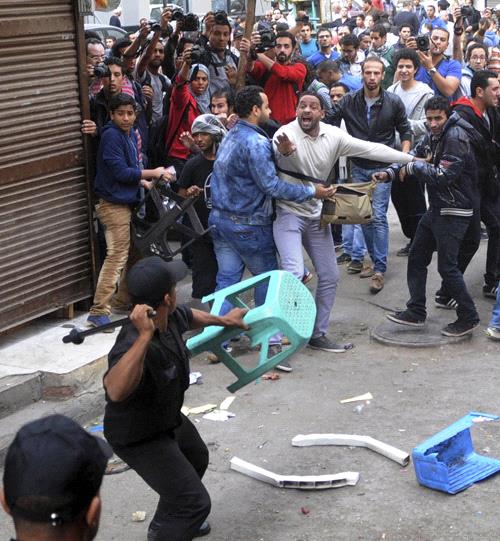Ammon News - AMMONNEWS -An Egyptian panel began voting Saturday on a new constitution intended to pave the way for a return to elected rule after July’s military overthrow of Islamist president Mohamed Morsi.
If adopted, the charter will be put to a popular referendum early next year in the first milestone of the military-installed government’s transition roadmap, to be followed by presidential and parliamentary elections in mid-2014.
Voting on the 247 articles began with 48 members of the 50-member panel in attendance, and was expected to continue Sunday, said Amr Musa, the head of the panel and former foreign minister under Hosni Mubarak, who was toppled by a pro-democracy uprising in 2011.
Within the first two hours the panel approved the first 50 of the 247 articles of the draft charter, including one stipulating that Islamic sharia law will be the main source of legislation. This clause has been retained from the Mubarak-era constitution.
After the army ousted Morsi in July, Egypt’s interim rulers suspended the 2012 constitution, which had been hastily drafted during his year in power by a panel dominated by Morsi’s Islamist allies.
The roadmap stipulates that a referendum on the constitution be held by the end of the year, but officials have said it is now expected in the second half of January.
The panel includes representatives from civil society, political parties, institutions such as the army and police, and the Coptic church.
But it includes just two Islamists, neither of whom is from Morsi’s Muslim Brotherhood, which won a series of polls following Mubarak’s ouster but has in recent months been the target of a sweeping crackdown that has seen more than 1,000 people killed.
Musa told reporters earlier that the panel “reached an agreement on the entire constitution which has been extensively revised” from the one adopted under Morsi.
But rights groups and activists criticised the draft, particularly Article 203, which would allow military trials of civilians accused of “direct attacks” on the armed forces, a provision they fear could be applied to protesters, journalists and dissidents.
The article says that “no civilian can be tried by military judges, except for crimes of direct attacks on armed forces, military installations and military personnel.”
Secular activists oppose military trials
Secular activists have demonstrated against Article 203, and security forces arrested prominent activist Alaa Abdel Fattah this week for an unauthorised demonstration against military trials of civilians.
On Saturday, Ahmed Maher, one of the leaders of the popular uprising against Mubarak, turned himself in after being ordered detained for holding a separate unauthorised demonstration in Cairo.
Maher arrived at a court in the capital accompanied by dozens of chanting supporters, whom police dispersed with tear gas.
On Sunday, interim president Adli Mansour approved a controversial law requiring organisers to seek authorisation three days ahead of any planned demonstration.
Activists and rights groups say that in addition to allowing military trials of civilians the draft charter also fails to curb the powers and privileges of Egypt’s military.
Article 234 stipulates that the defence minister be appointed in agreement with the Supreme Council of the Armed Forces, but panel spokesman Mohammed Salmawy told AFP this clause will be applicable only for the first two presidential terms.
Mahmoud Badr, representative of the Tamarrod movement, which spearheaded the campaign against Morsi, expressed satisfaction with the provisions concerning the military.
“This constitution realises the hopes and ambitions of the Egyptians after the revolt of June 30,” he said, referring to the day when millions took to the streets calling for Morsi’s resignation.
“Given the attacks on military forces these days, I am satisfied with the wording which puts limits on military trials of civilians,” he said, apparently referring to a spate of attacks on the security forces, mainly in the restive Sinai peninsula.
The draft also ensures that the military’s budget remains beyond civilian scrutiny.
Mussa told reporters the constitution “forbids forming religious parties or parties based on religious grounds,” but he later clarified to AFP that “a party can have a religious identity, but it has to abide by laws, the constitution and the Egyptian civil state”.
This provision could have consequences for the Freedom and Justice Party, the political arm of the banned Muslim Brotherhood. Virtually the entire top leadership of the 80-year-old Brotherhood has been detained since Morsi’s overthrow.
Bishop Paula, who represents the Coptic Christian Church on the panel, said: “The church is happy with the last version of the constitution. Every single Egyptian can find an article in this constitution that satisfies him.”
